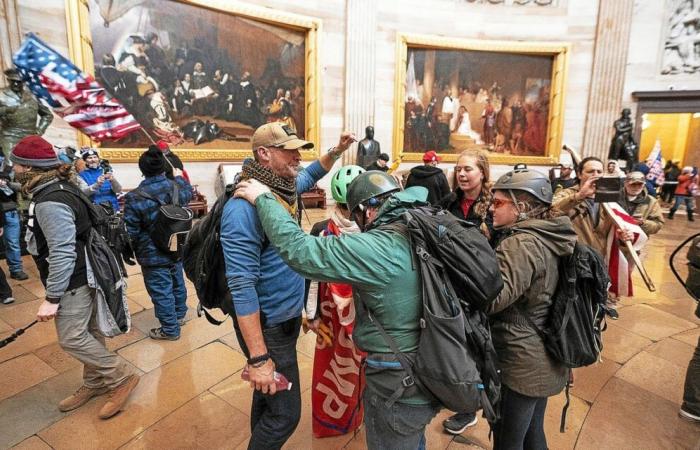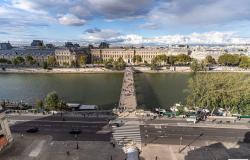Donald Trump, President of the United States as of January 20, has repeatedly promised to pardon the rioters who invaded the Capitol on January 6, 2021. A risky decision, far from being unanimous in the country and especially in Washington, scene of the attack.
1,200 Trump supporters charged, 600 convicted
“I was in my car, on the road near the Capitol, when it happened. It was crazy, I was listening to the radio, trying to figure out what was going on,” recalls teacher Jared Oerke. This January 6, 2021, he observed thousands of Donald Trump supporters storming the imposing building, the country's democratic pillar. The Republican refuses to admit his defeat against Joe Biden in the presidential election and calls on his supporters to
“to fight” and to “march to the Capitol”.
Thing said, thing done. They smash windows, destroy offices. More than 140 police officers were injured in the assault. In the months that followed, the rioters were tried for having participated in this insurrection. To date, more than 1,200 people have been charged and more than 600 sentenced to prison. With one hope: to be pardoned by Donald Trump, who is preparing to return to the White House, four years later.
Several dozen pardons in the first week?
Four years later, here we are. The day after the New Year, in front of the Capitol, a huge structure was erected to host the inauguration of Donald Trump, version 2025. Same scene in front of the White House, whose park usually open to tourists was closed to install stands. Yes, the American capital is preparing for Trump's official comeback. The event is scheduled for January 20. And Trump is also preparing for it… with the grace of his activists in mind.
In early December, in an interview with NBC News, he said it was “very likely” that he would pardon the January 6 rioters, on the first day of his mandate. In the process, to Time magazine, he assured that he “will look at each case individually. We will do it very quickly and it will start within the first hour of my taking office. The vast majority of them should not be in prison.” A way for him to “support and reward those who have been faithful to him”, analyzes Mark Osler, professor of law at Saint Thomas University in Minnesota. “I don't think he will pardon them all, because there are many of them, but I expect to see him pardon a small number of them, on the first day or in the first week of his coming to power, probably between 20 and 50,” he estimates.
A decision that divides America
However, this decision is far from unanimous. Even within the Republican Party, Donald Trump's allies are cautious. “Those who injured police officers, they are in another category, in my opinion, but I will let him be the judge,” said, for example, Senator Lindsey Graham. “Donald Trump has such control over his party, very few Republicans will oppose him publicly,” says Graham Dobbs, professor of political science at the University of Montreal and author of a book on the subject. The presidential pardon is, in any case, “one of the few unilateral powers enshrined in the Constitution of the United States and it has very few limits: all he has to do is take out a pen and sign”, adds -he.
No limits in the number of pardons granted, in the process, and with immediate effect. The only constraint is that you can only pardon crimes at the federal level. “The other limit is rather political, because such a decision is not always popular,” continues Graham Dobbs. And, in a country as divided as America after an electric presidential election, the amnesty for the January 6 rioters makes people cringe. Near Dupont circle, roundabout
at the crossroads of several residential neighborhoods in Washington, Annie Pelayo pouts. “It's not okay to forgive, it gives the impression that he approves of the violent behavior of the rioters,” she whispers, beret on her head.
“I’d be shocked!” »
The teacher, who came from San Diego, California, insists: “If he does that, he makes it seem like it’s okay to participate in a riot.” A few steps away, in the small doggie park on S. Street, Jared Oerke agrees: “I would be shocked, like I was shocked by his decisions four years ago. Pardoning them will simply cement the polarization of this country,” he continues. Mark Osler confirms this double-edged bet by Trump: “This decision will be popular with his voters and widely contested by his opponents.”






